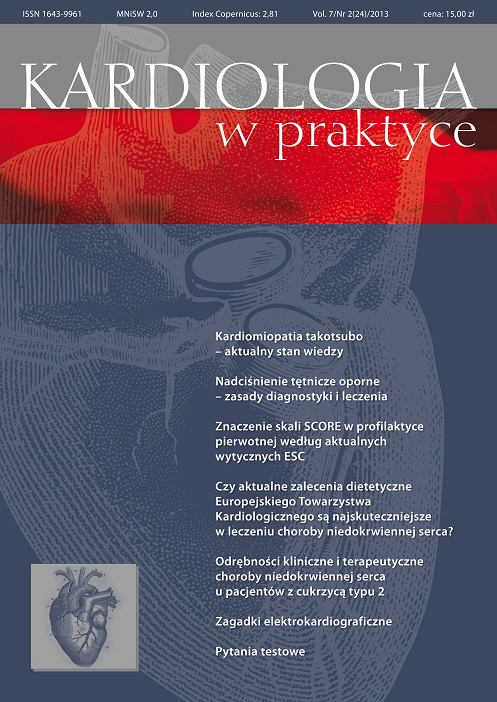Coronary artery disease in patients with diabetes type 2 Review article
Main Article Content
Abstract
Cardiovascular disease is the main cause of increased mortality in diabetes patients. Coronary artery disease and myocardial infarction are diagnosed 2–4 time more frequently and significantly earlier in diabetic patient than in patients without diabetes. Non-invasive methods used in diagnostics of coronary heart disease in diabetes patients include exercise test, stress echocardiography and perfusion scintigraphy of myocardium. These methods have to define the indications for coronarography, which is an invasive method of coronary arteries imaging. Article presents management of coronary heart disease in patients with diabetes mellitus. In the last decade the position of beta-blockers and ACE-inhibitors significantly changed. The more important role in therapy play metabolic control of diabetes, proper blood pressure and lipid metabolism control.
Downloads
Article Details

This work is licensed under a Creative Commons Attribution-NonCommercial-NoDerivatives 4.0 International License.
Copyright: © Medical Education sp. z o.o. This is an Open Access article distributed under the terms of the Attribution-NonCommercial 4.0 International (CC BY-NC 4.0). License (https://creativecommons.org/licenses/by-nc/4.0/), allowing third parties to copy and redistribute the material in any medium or format and to remix, transform, and build upon the material, provided the original work is properly cited and states its license.
Address reprint requests to: Medical Education, Marcin Kuźma (marcin.kuzma@mededu.pl)
References
2. Norhammar A., Malmberg K., Ryden L. et al.: Register of Information Knowledge about Swedish Heart Intensive Care Admission (RIKS-HIA). Under utilization of evidence based treatment partially explains for the unfavourable prognosis in diabetic patients with acute myocardial infarcion. Eur. Heart J. 2003, 24: 838-44.
3. Franklin K., Goldberg R.J., Spencer F. et al.: Implications of diabetes in patients with acute coronary syndromes. The Global Registry of Acute Coronary Events. Arch. Intern. Med. 2004, 164: 1457-63.
4. Norhammar A., Tenerz A., Nilsson G. et al.: Glucose metabolism in patients with acute myocardial infarction and no previous diagnosis of diabetes mellitus: a prospective study. Lancet 2002, 359: 2140-44.
5. Bartnik M., Malmberg K., Hamsten A. et al.: Abnormal glucose tolerance – a common risk factor in patients with acute myocardial infarction in comparison with population-based controls. J. Intern. Med. 2004, 256: 288-97.
6. Hasdai D., Behar S., Wallentin L.: A prospective survey of the characteristics, treatments and outcomes of patients with acute coronary syndromes in Europe and the Mediterranean basin; the Euro Heart Survey of Acute Coronary Syndromes (Euro Heart Survey ACS). Eur. Heart J. 2002, 23: 1190-201.
7. Stratton I.M., Adler A.I., Neil H.A. et al.: Association of glycaemia with macrovascular and microvascular complications of type 2 diabetes (UKPDS 35): prospective observational study. BMJ 2000, 321: 405-12.
8. Freemantle N., Cleland J., Young P. et al.: Beta blockade after myocardial infarction: systematic review and meta regression analysis. BMJ 1999, 318: 1730-37.
9. Chen J., Marciniak T.A., Radford M.J. et al.: Beta-blocker therapy for secondary prevention of myocardial infarction in elderly diabetic patients: results from the National cooperative Cardiovascular Project. J. Am. Coll. Cardiol. 1999, 34: 1388-94.
10. Heart Outcomes Prevention Evaluation Study Investigators. Effects of ramipril on cardiovascular and microvascular outcomes in people with diabetes mellitus: results of the HOPE study and MICRO-HOPE substudy. Lancet 2000, 355: 253-59.
11. Fox K.M., European Trial on Reduction of Cardiac Events with Perindopril in Stable Coronary Artery Disease Investigators: Efficacy of perindopril in reduction of cardiovascular events among patients with stable coronary artery disease: randomised, double-blind, placebo-controlled, multicentre trial (the EUROPA study). Lancet 2003, 362: 782-8.
12. Zuanetti G., Latini R., Maggioni A.P.: Effect of the ACE inhibitor lisinopril on mortality in diabetic patients with acute myocardial infarction: data from the GISSI-3 study. Circulation 1997, 96: 4239-45.
13. Bertrand M.E., Simoons M.L., Fox K.A.: Management of acute coronary syndromes in patients presenting without persistent ST-segment elevation. Eur. Heart J. 2002, 23: 1809-40.
14. Antithrombotic Trialists’ Collaboration. Collaborative meta-analysis of randomised trials of antiplatelet therapy for prevention of death, myocardial infarction, and stroke in high risk patients. BMJ 2002, 324: 71-86.
15. Babapulle M.N., Joseph L., Belisle P., Brophy J.M., Eisenberg M.J.: A hierarchical Bayesian meta-analysis of randomized clinical trials of drug-eluting stents. Lancet 2004, 364: 583-91.
16. Silber S., Albertson P., Aviles F.F., Camici P.G., Colombo A., Hamm C., Jorgensen E., Marco J., Nordreahug J-G., Ruo W., Urban P., Stone G.W., Wijns W.: Guidelines for percutaneous coronary interventions. Ital. Heart J. 2005, 6: 427-74.
17. Influence of diabetes on 5-year mortality and morbidity in a randomized trial comparing CABG and PTCA in patients with multivessel disease: the Bypass Angioplasty Revascularization Investigation (BARI). Circulation 1997, 96: 1761-69.
18. Brener S.J., Lincoff A.M., Bates E.R. et al.: GUSTO V Investigators. The relationship between baseline risk and mortality in ST-elevation acute myocardial infarction treated with pharmacological reperfusion: insights from the Global Utilization of Strategies To open Occluded arteries (GUSTO) V trial. Am. Heart J. 2005, 150: 89-93.

